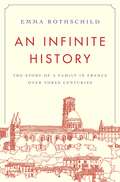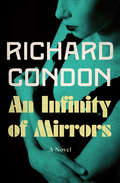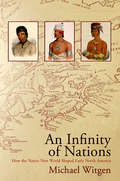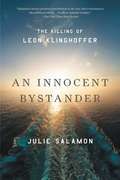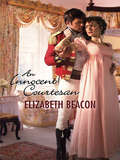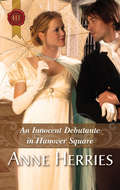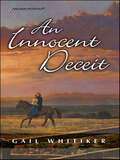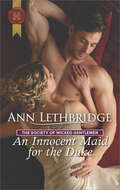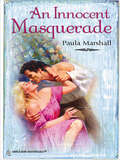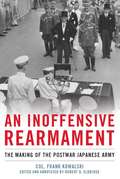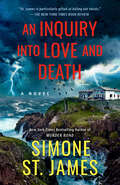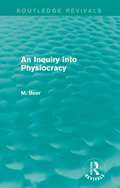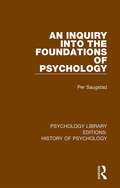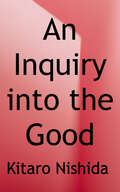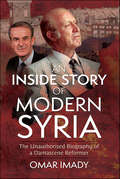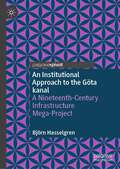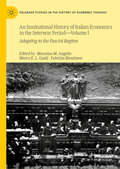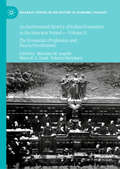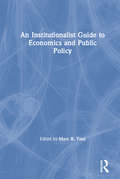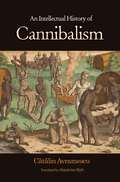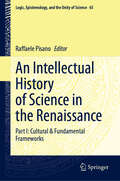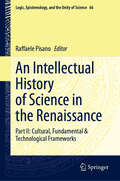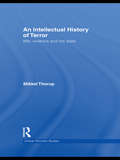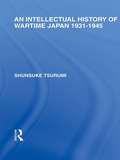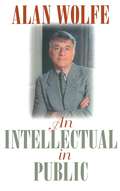- Table View
- List View
An Infinite History: The Story of a Family in France over Three Centuries
by Emma RothschildAn innovative history of deep social and economic changes in France, told through the story of a single extended family across five generationsMarie Aymard was an illiterate widow who lived in the provincial town of Angoulême in southwestern France, a place where seemingly nothing ever happened. Yet, in 1764, she made her fleeting mark on the historical record through two documents: a power of attorney in connection with the property of her late husband, a carpenter on the island of Grenada, and a prenuptial contract for her daughter, signed by eighty-three people in Angoulême. Who was Marie Aymard? Who were all these people? And why were they together on a dark afternoon in December 1764? Beginning with these questions, An Infinite History offers a panoramic look at an extended family over five generations. Through ninety-eight connected stories about inquisitive, sociable individuals, ending with Marie Aymard’s great-great granddaughter in 1906, Emma Rothschild unfurls an innovative modern history of social and family networks, emigration, immobility, the French Revolution, and the transformation of nineteenth-century economic life.Rothschild spins a vast narrative resembling a period novel, one that looks at a large, obscure family, of whom almost no private letters survive, whose members traveled to Syria, Mexico, and Tahiti, and whose destinies were profoundly unequal, from a seamstress living in poverty in Paris to her third cousin, the cardinal of Algiers. Rothschild not only draws on discoveries in local archives but also uses new technologies, including the visualization of social networks, large-scale searches, and groundbreaking methods of genealogical research.An Infinite History demonstrates how the ordinary lives of one family over three centuries can constitute a remarkable record of deep social and economic changes.
An Infinity of Mirrors
by Richard CondonA Jewish woman in love with a Prussian officer moves to Hitler&’s Berlin in this ominous, &“spectacular&” novel by the New York Times–bestselling author (Kirkus Reviews). Every afternoon, Paule tends to her father&’s newspaper clippings and listens to his stories. An actor, Paul-Alain Bernheim has a sexual appetite and a lust for life that have made him a legend of the Paris stage. He is also a fiercely proud Jew, and he has imbued his daughter with an unshakeable pride in the history of her people. So why, she wonders, has she fallen in love with a German? From the moment Paule spots Wilhelm von Rhode at an embassy reception, she can&’t take her eyes off him. So after a whirlwind Paris romance, when von Rhode is recalled to Berlin, Paule follows as his wife. But as the Nazis tighten their stranglehold on Germany and the world prepares for war, their love may not survive what is to come. &“Fascinating.&” —Life
An Infinity of Nations: How the Native New World Shaped Early North America
by Michael WitgenAn Infinity of Nations explores the formation and development of a Native New World in North America. Until the middle of the nineteenth century, indigenous peoples controlled the vast majority of the continent while European colonies of the Atlantic World were largely confined to the eastern seaboard. To be sure, Native North America experienced far-reaching and radical change following contact with the peoples, things, and ideas that flowed inland following the creation of European colonies on North American soil. Most of the continent's indigenous peoples, however, were not conquered, assimilated, or even socially incorporated into the settlements and political regimes of this Atlantic New World. Instead, Native peoples forged a New World of their own. This history, the evolution of a distinctly Native New World, is a foundational story that remains largely untold in histories of early America. <p><p> Through imaginative use of both Native language and European documents, historian Michael Witgen recreates the world of the indigenous peoples who ruled the western interior of North America. The Anishinaabe and Dakota peoples of the Great Lakes and Northern Great Plains dominated the politics and political economy of these interconnected regions, which were pivotal to the fur trade and the emergent world economy. Moving between cycles of alliance and competition, and between peace and violence, the Anishinaabeg and Dakota carved out a place for Native peoples in modern North America, ensuring not only that they would survive as independent and distinct Native peoples but also that they would be a part of the new community of nations who made the New World.the continent's indigenous peoples, however, were not conquered, assimilated, or even socially incorporated into the settlements and political regimes of this Atlantic New World. Instead, Native peoples forged a New World of their own. This history, the evolution of a distinctly Native New World, is a foundational story that remains largely untold in histories of early America.Through imaginative use of both Native language and European documents, historian Michael Witgen recreates the world of the indigenous peoples who ruled the western interior of North America. The Anishinaabe and Dakota peoples of the Great Lakes and Northern Great Plains dominated the politics and political economy of these interconnected regions, which were pivotal to the fur trade and the emergent world economy. Moving between cycles of alliance and competition, and between peace and violence, the Anishinaabeg and Dakota carved out a place for Native peoples in modern North America, ensuring not only that they would survive as independent and distinct Native peoples but also that they would be a part of the new community of nations who made the New World.
An Innocent Bystander: The Killing of Leon Klinghoffer
by Julie SalamonThe definitive story of one American family at the center of a single, shocking act of international terrorism that "manages to capture the essence of the Israeli-Palestinian conflict"(Dan Ephron) On October 3, 1985, Leon Klinghoffer, a disabled Jewish New Yorker, and his wife boarded the Achille Lauro to celebrate their 36th wedding anniversary with a Mediterranean cruise. Four days later, four Palestinian fedayeen hijacked the Italian luxury liner and took the passengers and crew hostage. Leon Klinghoffer was shot in the head, his body and wheelchair thrown overboard. His murder became a flashpoint in the intractable struggle between Israelis and Arabs and gave Americans a horrifying preview of what it means when terrorism hits home. In this richly reported book, drawing on multiple perspectives, Julie Salamon dispels the mythology that has grown around that shattering moment. What transpired on the Achille Lauro left the Klinghoffer family in the grip of irredeemable sorrow, while precipitating tragic reverberations for the wives and sons of Abu al-Abbas, the Palestinian mastermind behind the hijacking, and the family of Alex Odeh, a Palestinian-American murdered in Los Angeles in a brutal act of retaliation. Through intimate interviews with almost all living participants, including one of the hijackers, Julie Salamon brings alive the moment-by-moment saga of the hijacking and the ensuing U.S.-led international manhunt; the diplomatic wrangling between the United States, Egypt, Italy, and Israel; and the long agonizing search for justice. The book also reveals the back story of the controversial opera about the Klinghoffer tragedy that provoked a culture war. An Innocent Bystander is a masterful work of journalism that moves between the personal and the global with the pace of a geopolitical thriller and the depth of a psychological drama. Throughout lies the tension wrought by terrorism and its repercussions today.
An Innocent Courtesan
by Elizabeth BeaconFrom unloved bride. . . Caroline Besford will no longer be any man's pawn. Her father forced her into marriage with a man who refused to share her bed. In making her escape, Caro became Cleo--an untouched courtesan! Amazingly, the husband who ignored his plain bride is now pursuing her!. . . to adored mistress!But as Cleo is drawn into a web of lies and deception, she cannot deny her growing desire for her husband. And what will the colonel do when he discovers that his darling Cleo is his dowdy wife, Caroline?
An Innocent Debutante in Hanover Square (A Season in Town #2)
by Anne HerriesInnocent miss, powerful lord!Debutante Helene Henderson has been given a gift of one season in London-if she is to save her impoverished family, she must find a husband! Only, unworldly Helene's compassionate nature leads her into the path of a handsome rake with secrets of his own...Lord Max Coleridge is intrigued by Helene's beguiling mix of shyness and spirit-but with his life in danger, how can he put her at risk? Helene's courage shines through, and Max intends to solve this mystery-and make this innocent miss his bride!
An Innocent Deceit
by Gail WhitikerA Lady’s DeceptionWhen the Earl of Carlyle suddenly decides to leave London to become better acquainted with the young daughter he barely knows, Miss Antonia Hadley’s plans go awry. Believing the man abandoned his daughter, Antonia has no compunction about persuading the earl’s servants to help her deceive him. Determined to help little Clara overcome her fear of horses, Antonia teaches her to ride, under the guise of a Mr. Anthony Davlin. Soon the earl notices something just a bit odd about his daughter’s riding instructor. Can Antonia keep her secret, or will Carlyle expose her innocent deceit?
An Innocent Maid for the Duke: An Innocent Maid For The Duke Courting Danger With Mr. Dyer Scandal And Miss Markham (The Society of Wicked Gentlemen #2)
by Ann LethbridgeIn this red-hot Regency romance, an innocent maid plays naughty a newly titled duke.Jacob, Duke of Westmoor, is feeling the weight of his recently inherited title. Escaping to his private gentlemen’s club brings more than the usual comforts when he shares an illicit kiss with a beautiful woman he’s never met. It is impossible to get the mystery woman out of his mind—especially when he discovers she’s a maid!Unable to let the beautiful innocent go, he arranges for Rose Nightingale to become his grandmother’s companion. But living under the same roof, their attraction becomes impossible to resist!
An Innocent Masquerade
by Paula MarshallTHE MYSTERY MAN OF HER DREAMSAfter losing his beloved wife in childbirth, Thomas Dilhorne is a man inconsolable. Worried that his son will never recover from his grief, Thomas’s father sends him to Melbourne to do a little business and try to enjoy himself. But an attack by robbers turns the Dilhorne heir into a man who can remember neither his name nor his past.Kirstie Moore can hardly believe it when her father brings home a mysterious vagrant! Fred Waring might have duped her father into believing he was a decent sort, but Kirstie has her suspicions. Soon “Fred” proves he’s a good worker and works his charms on the Moore family, including beautiful Kirstie. But will she still love him when she discovers his true identity?
An Inoffensive Rearmament
by Robert D. Eldridge Frank KowalskiColonel Frank Kowalski served as the Chief of Staff of the American military advisory group that helped establish the National Police Reserve, the predecessor to the Japan Self-Defense Forces, and provided daily guidance to it during its first two years of existence. In this book, Kowalski provides, with great care, a detailed account of the manning, logistics, and personalities involved in standing up, on short notice, of a force of approximately 75,000, while sharing insights about the diplomatic, political, legal, and constitutional challenges his headquarters and his Japanese counterparts faced in navigating this new course for Japan in the wake of the sudden outbreak of war on the Korean Peninsula in June 1950. In light of these limitations, the path for rearmament had to be slow and "inoffensive" while psychologically and materially contributing to Japan's defense. His account is balanced, a blend of both criticism and praise, of all of those involved, including himself. Kowalski, who later served in Congress, was a highly intelligent Army officer who was expecting to be deployed to Korea in the summer of 1950, after serving in local military governments in western Japan, when he was tapped for the above secret mission to make a new Japanese army while having to call it a police reserve. An honorable man, he was pained by the subterfuge he and his government, working hand in hand with the Japanese government, had to play in order to establish this needed organization and believes many things were mishandled, but also viewed the "quiet and reasonable approach" of the rearmament program as successful and allowing the NPR to "adequately and effectively" provide for the urgent defense needs of the Japan and the United States, with its quarter million dependents left to fend for themselves in Japan in 1950. Kowalski notes that there has always been a tension in the postwar U.S.-Japan relationship over Japan not doing enough to contribute to the bilateral alliance and international security. This book will not end that debate, but it provides greater context and historical understanding of what factors existed at the time. This is a particularly important topic as Japan is re-examining its defense posture today, both for its own needs as well as to strengthen its still complicated relationship with the United States, its only alliance partner. Written in the mid-1960s, and published in Japanese in 1969, this is the first time this edited book has appeared in English.
An Inquiry into Love and Death
by Simone St. JamesA young woman searches for the truth behind her uncle&’s mysterious death in a town haunted by a restless ghost in this gripping novel by the New York Times bestselling author of The Book of Cold Cases.Oxford student Jillian Leigh works day and night to keep up with her studies—so to leave at the beginning of the term is next to impossible. But after her uncle Toby, a renowned ghost hunter, is killed in a fall off a cliff, she must drive to the seaside village of Rothewell to pack up his belongings. Almost immediately, unsettling incidents—a book left in a cold stove, a gate swinging open on its own—escalate into terrifying events that convince Jillian an angry spirit is trying to enter the house. Is it Walking John, the two-hundred-year-old ghost who haunts Blood Moon Bay? And who beside the ghost is roaming the local woods at night? If Toby uncovered something sinister, was his death no accident? The arrival of handsome Scotland Yard inspector Drew Merriken, a former RAF pilot with mysteries of his own, leaves Jillian with more questions than answers—and with the added complication of a powerful, mutual attraction. Even as she suspects someone will do anything to hide the truth, she begins to discover spine-chilling secrets that lie deep within Rothewell…and at the very heart of who she is.
An Inquiry into Physiocracy (Routledge Revivals)
by Max BeerThe common understanding of physiocracy – the school of eighteenth-century political economy associated with thinkers such as Boisguillebert and Quesnay – is often confined to the view that it considered agriculture the only source of wealth, and manufacture, trade and export as unproductive. The limitations of this view are particularly acute for those wishing to chart the ancien régime as it approached 1789. First published in 1939, this study attempts to answer such questions as: What is the meaning of physiocracy? What is the provenance of its various doctrines? What were its ultimate intentions? For many it is unclear how the physiocrats could expound such views against all the arguments employed by their opponents: particularly so given that, among them, were men revered by the likes of Adam Smith, either as profound thinkers, such as Quesnay, or as statesmen, such as Turgot.
An Inquiry into the Foundations of Psychology (Psychology Library Editions: History of Psychology)
by Per SaugstadDr Saugstad’s dominant interest was in the area of thinking. Many psychologists would have been familiar with his published work in this field at the time. To gain a clearer understanding of the thought processes, he carried out extensive studies of perception. First published in 1965, this book originated in an attempt to reconcile a phenomenological and a behavioristic approach to psychology. Basic assumptions in phenomenology, behavioristics and psychophysics are examined. It is shown that in phenomenology theoretical concepts tend to be treated as observations, whereas in behavioristics observations tend to be treated as theoretical concepts. It is pointed out that the relationship between observer and observed event is confused throughout the history of psychology. This confusion, the author insists, is due to the fact that man’s cognitive processes are to a large extent unknown. In relating observations to each other, the psychologist will of necessity contaminate his observations unless he follows specific rules. This fundamental point had apparently not been previously realized by psychologists. In order to develop an adequate conception of scientific psychology, the nature of man’s cognitive processes must be taken into account. When this is done, one sees that drastic revisions of current conceptions of psychology are necessary. This book presents a conception of psychology which does take into account man’s cognitive processes.
An Inquiry into the Good
by Kitaro NishidaThis book represented the foundation of Nishida's philosophy--reflecting both his deep study of Zen Buddhism and his thorough analysis of Western philosophy--and established its author as the foremost Japanese philosopher of this century. <p><p>In this important new translation, two scholars--one Japanese and one American--have worked together to present a lucid and accurate rendition of Nishida's ideas.
An Inside Story of Modern Syria: The Unauthorised Biography of a Damascene Reformer
by Omar ImadyThe Syrian Arab Republic has rarely been out of the headlines following the rise to power of Hafiz al-Asad in 1970 and Bashar al-Asad in 2000 and has been at the heart of the popular protests which have come to be known as the Arab Spring. This is a political biography of the author's father, Dr Muhammad Imady, the longest-serving minister of economy in modern Syria, and holder of several senior government posts. Dr Imady served at the center of government, personally and professionally, during Hafiz al-Asad’s presidency, and was an intimate and objective observer of all aspects of Syria's turbulent history. Omar Imady follows his father’s story from his beginnings to the present day, charting out the seemingly never-ending civil conflict, human suffering, and international interventions that plague the country’s past and present. This is an inside story based on rare sources and experiences from both father and son. It illustrates the original and unique contribution of Muhammad Imady as a 'Damascene Reformer', a rare individual who pursued the seemingly impossible task of implementing positive change while serving a regime that demanded obedience and loyalty in response to actions often at odds with Muhammad Imady’s own liberal democratic political ideas. At its heart, this book examines the timeless challenge of maintaining one’s own integrity and principles in the face of a power system which seems bent on promoting the opposite.
An Institutional Approach to the Göta kanal: A Nineteenth-Century Infrastructure Mega-Project
by Björn HasselgrenThis book is based on an institutional evolutionary theoretical view to the Göta kanal. Canals were the major transport infrastructure system besides roads and maritime transport until railroads were introduced. The canal studied is the Swedish Göta kanal project during the preparation and construction phase from 1800–1832. Thus, the Göta kanal, and the canal-era, is seen from a technological, an economic and a political perspective. Comparisons are made with two contemporary major canal-projects; the Erie Canal in the USA (1817–1825) and the Caledonian Canal in Britain (1804–1822). It is argued that the Göta kanal project, as Sweden's Mega Project of its time, represented an important development step in Sweden as regards learning and innovation and became a starting point for Swedish transport infrastructure projects in the time to come, primarily the railways.
An Institutional History of Italian Economics in the Interwar Period — Volume I: Adapting to the Fascist Regime (Palgrave Studies in the History of Economic Thought)
by Fabrizio Bientinesi Massimo M. Augello Marco E. L. GuidiItaly is well known for its prominent economists, as well as for the typical public profile they have constantly revealed. But, when facing an illiberal and totalitarian regime, how closely did Italian economists collaborate with government in shaping its economic and political institutions, or work independently? This edited book completes a gap in the history of Italian economic thought by providing a complete work on the crucial link between economics and the Fascist regime, covering the history of political economy in Italy during the so-called “Ventennio” (1922-1943) with an institutional perspective. The approach is threefold: analysis of the academic and extra-academic scene, where economic science was elaborated and taught, the connection between economics, society and politics, and, dissemination of scientific debate. Special attention is given to the bias caused by the Fascist regime to economic debate and careers. This Volume I deals with the economics profession under Fascism, in particular in light of the political and institutional changes that the regime introduced, the restructuring of higher education, the restriction of freedom in teaching and of the press, and with respect to promoting its own strategies of political and ideological propaganda. Volume II (available separately) considers the public side of the economics profession, the “fascistisation” of culture and institutions, banishment and emigration of opponents, and post-WW2 purge of Fascist economists.
An Institutional History of Italian Economics in the Interwar Period — Volume II: The Economics Profession and Fascist Institutions (Palgrave Studies in the History of Economic Thought)
by Fabrizio Bientinesi Massimo M. Augello Marco E. L. GuidiItaly is well known for its prominent economists, as well as for the typical public profile they have constantly revealed. But, when facing an illiberal and totalitarian regime, how closely did Italian economists collaborate with government in shaping its economic and political institutions, or work independently? This edited book completes a gap in the history of Italian economic thought by addressing in a comprehensive way the crucial link between economics and the fascist regime, covering the history of political economy in Italy during the so-called “Ventennio” (1922-1943) with an institutional perspective. The approach is threefold: analysis of the academic and extra-academic scene, where economic science was elaborated and taught, the connection between economics, society and politics, and the dissemination of scientific debate. Special attention is given to the bias caused by the Fascist regime to economic debate and careers. This Volume II looks at the role that economists played in society and in politics, and how this was played. In exploring the public side of the profession and the “fascistisation” of institutions, this book also examines academic epuration and emigration, and the post-WW2 purge of fascist economists. Volume I (available separately) explores how the economics profession was managed under fascism, the restructuring of higher education, the restriction of freedom in teaching and of the press, and various fascist cultural and propaganda initiatives.
An Institutionalist Guide to Economics and Public Policy
by Marc R. ToolThis narrative recounts the 18th and 19th century "shipping out" of Pacific islanders aboard European and American vessels, a kind of "counter-exploring", that echoed the ancient voyages of settlement of their island ancestors.
An Intellectual History of Cannibalism
by Cătălin AvramescuThe cannibal has played a surprisingly important role in the history of thought--perhaps the ultimate symbol of savagery and degradation-- haunting the Western imagination since before the Age of Discovery, when Europeans first encountered genuine cannibals and related horrible stories of shipwrecked travelers eating each other. An Intellectual History of Cannibalism is the first book to systematically examine the role of the cannibal in the arguments of philosophers, from the classical period to modern disputes about such wide-ranging issues as vegetarianism and the right to private property. Catalin Avramescu shows how the cannibal is, before anything else, a theoretical creature, one whose fate sheds light on the decline of theories of natural law, the emergence of modernity, and contemporary notions about good and evil. This provocative history of ideas traces the cannibal's appearance throughout Western thought, first as a creature springing from the menagerie of natural law, later as a diabolical retort to theological dogmas about the resurrection of the body, and finally to present-day social, ethical, and political debates in which the cannibal is viewed through the lens of anthropology or invoked in the service of moral relativism. Ultimately, An Intellectual History of Cannibalism is the story of the birth of modernity and of the philosophies of culture that arose in the wake of the Enlightenment. It is a book that lays bare the darker fears and impulses that course through the Western intellectual tradition.
An Intellectual History of Science in the Renaissance: Part I: Cultural & Fundamental Frameworks (Logic, Epistemology, and the Unity of Science #65)
by Raffaele PisanoThis first of a two-part volume (Book I) deals with a unit intellectual cultural history of science in the Renaissance within fundamental frameworks. An intellectual cultural history of science examines how human and their intellectual experiences have been expressed in, and emerged by scientific ideas. Taking into account the excellence of the essays – which cover several branches and disciplines in history and epistemology of science – this book also provides perspectives on the enduring influence of a historiographical tradition, e.g., the emergence of fundamental works on mathematics and geometry, household&’s principal functions, food and culture, clock instrumentation, surgery as a practical branch of medicine. It describes the ways it differently accounted for variation in unlike countries and consequently how its results remain, still nowadays, a debated question, as well as due to constraints preventing an extensive exploration of its remarkable historiography. This volume gathers selected and double peer review contributions by historians of physics/mathematics/science as new fundamental perceptions in the history of science during the Renaissance, ranging across several fields of science within its intellectual and cultural history. The book is an accessible avenue to understanding cultural issues to develop scientific ideas by leading authorities who offer much-needed historical insights into the field of intellectual and fundamental history of science. It provides an absorbing and revealing read for historians, philosophers and scientists alike.
An Intellectual History of Science in the Renaissance: Part II: Cultural, Fundamental & Technological Frameworks (Logic, Epistemology, and the Unity of Science #66)
by Raffaele PisanoThis second of a two-part volume (Book II) extends the historical–scientific inquiry of first-part volume (Book I) by considering other specific case studies within cultural, fundamental & technological frameworks. An intellectual cultural history of science & technology examines how human and their applied sciences-experiences have been expressed in, and trained by ideas and technologies. The contributors explain ways in which the sciences allowed advanced modelling on the one hand, and the development of new technological ideas on the other hand, including methods and theories, institutions, engineering devices/instrumentation and social implications as well. Taking into account the excellence of the essays, the book covers several branches and disciplines in science & technology, e.g., theoretical mathematics and the empirical work, machinery and mechanisms, stored information, transportation, inquiring methods in history and historiography of science & technology. It describes the ways it differently accounted for variation in unlike contexts and consequently how its results remain, still nowadays, a debated question, as well as due to constraints preventing an extensive exploration of its remarkable historiography. The book gathers selected and double peer review contributions by historians of physics/mathematics/engineering/science as new perceptions of the history of science during the Renaissance ranging across several fields of science within its fundamental, cultural & technological history. The volume is an accessible avenue to understanding cultural ideas & technologies by leading authorities who offer much-needed historical insights into the field of and intellectual history of science & technology. It provides an absorbing and revealing read for historians, philosophers, and scientists alike.
An Intellectual History of Terror: War, Violence and the State (Routledge Critical Terrorism Studies)
by Mikkel ThorupThis book investigates terrorism and anti-terrorism as related and interacting phenomena, undertaking a simultaneous reading of terrorist and statist ideologists in order to reconstruct the 'deadly dialogue' between them. This work investigates an extensive array of violent phenomena and actors, trying to broaden the scope and ambition of the history of terrorism studies. It combines an extensive reading of state and terrorist discourse from various sources with theorizing of modernity's political, institutional and ideological development, forms of violence, and its guiding images of self and other, order and disorder. Chapters explore groups of actors (terrorists, pirates, partisans, anarchists, Islamists, neo-Nazis, revolutionaries, soldiers, politicians, scholars) as well as a broad empirical source material, and combine them into a narrative of how our ideas and concepts of state, terrorism, order, disorder, territory, violence and others came about and influence the struggle between the modern state and its challengers. The main focus is on how the state and its challengers have conceptualized and legitimated themselves, defended their existence and, most importantly, their violence. In doing so, the book situates terrorism and anti-terrorism within modernity's grander history of state, war, ideology and violence. This book will be of much interest to students of critical terrorism studies, political violence, sociology, philosophy, and Security Studies/IR in genera Mikkel Thorup is Assistant Professor at the Institute of Philosophy and the History of Ideas, University of Aarhus, Denmark.
An Intellectual History of Wartime Japan: 1931-1945 (Routledge Library Editions: Japan)
by Shunsuke TsurumiWhen this book was published in Japanese in 1982 it was awarded the prestigious Jiro Osaragi Prize. It is an important contribution to the understanding of the mental and spiritual world of Japan just over two generations ago. The author argues that just as the period of isolation up to the middle of the 19th century was crucial for Japan’s development, so the Second World War represented another crucial period for the country. These years were a period of intellectual isolation during which significant development took place.
An Intellectual in Public
by Alan WolfeA new collection of essays from one of the most courageous and honest thinkers writing today "The question of the public intellectual is very much in the air again," writes Alan Wolfe. As one of our eminent social commentators, Wolfe should know; he's been writing, with fierce intellectual independence, about American public and private life since the 1960s. In this new collection of essays spanning seven years of contributions to The New Republic, The New Yorker, Atlantic Monthly, and other prominent publications, Wolfe displays the courage necessary to write honestly--yet free of ideology, cant, and piety--about the things Americans take very seriously. Wolfe thinks big; indeed, the essays in An Intellectual in Public confront many of the most controversial issues of our time: country, God, race, sex, material consumption, and left and right. Beginning and ending the book are original essays describing the public intellectual's role, and how Wolfe believes that role ought to be filled. An Intellectual in Public is not only a demonstration of Wolfe's pointed analytical skills but a testament to his belief that "severely ideological thinking" is inappropriate for some of our most difficult problems, and that "neither the right nor the left can speak for all of America. " Alan Wolfe is the director of the Boisi Center for Religion and American Public Life and also Professor of Political Science at Boston College. He is the author of over a dozen books, including One Nation After All: What Middle Class Americans Really Think About: God, Country, Family, Racism, Welfare, Immigration, Homosexuality, Work, the Right, the Left and Each Other.
